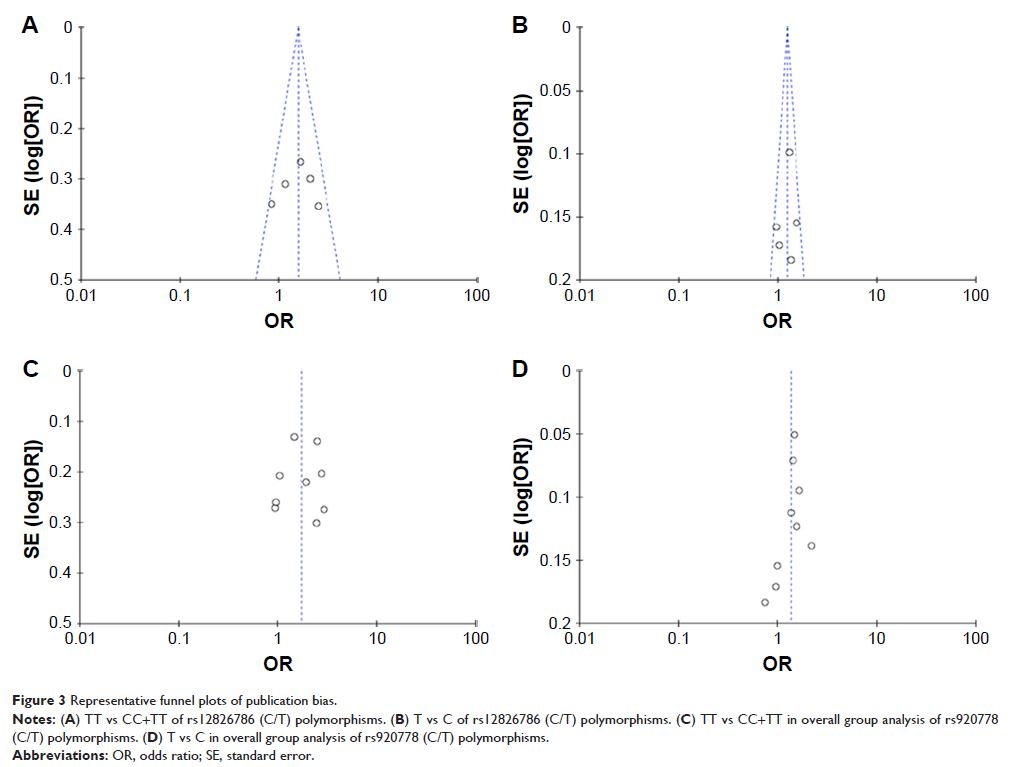108985
论文已发表
注册即可获取德孚的最新动态
IF 收录期刊
- 3.4 Breast Cancer (Dove Med Press)
- 3.2 Clin Epidemiol
- 2.6 Cancer Manag Res
- 2.9 Infect Drug Resist
- 3.7 Clin Interv Aging
- 5.1 Drug Des Dev Ther
- 3.1 Int J Chronic Obstr
- 6.6 Int J Nanomed
- 2.6 Int J Women's Health
- 2.9 Neuropsych Dis Treat
- 2.8 OncoTargets Ther
- 2.0 Patient Prefer Adher
- 2.2 Ther Clin Risk Manag
- 2.5 J Pain Res
- 3.0 Diabet Metab Synd Ob
- 3.2 Psychol Res Behav Ma
- 3.4 Nat Sci Sleep
- 1.8 Pharmgenomics Pers Med
- 2.0 Risk Manag Healthc Policy
- 4.1 J Inflamm Res
- 2.0 Int J Gen Med
- 3.4 J Hepatocell Carcinoma
- 3.0 J Asthma Allergy
- 2.2 Clin Cosmet Investig Dermatol
- 2.4 J Multidiscip Healthc

HOTAIR 基因多态性与癌症易感性之间的关联关系:一个更新的系统回顾和综合分析
Authors Min L, Mu X, Tong A, Qian Y, Ling C, Yi T, Zhao X
Received 12 September 2017
Accepted for publication 3 December 2017
Published 14 February 2018 Volume 2018:11 Pages 791—800
DOI https://doi.org/10.2147/OTT.S151454
Checked for plagiarism Yes
Review by Single-blind
Peer reviewers approved by Dr Colin Mak
Peer reviewer comments 3
Editor who approved publication: Prof. Dr. Geoffrey Pietersz
Objectives: This
work aims to explore whether HOX transcript antisense intergenic RNA (HOTAIR)
polymorphisms are associated with cancer susceptibility.
Materials and
methods: A comprehensive search was conducted
for literature published from January 2007 to July 2017. The pooled odds ratios
(ORs) and the corresponding 95% CIs were calculated using the Revman 5.2
software. Eighteen articles of 36 case–control studies were enrolled including
six HOTAIR polymorphisms and 10 cancer types.
Results: The results showed that cancer risk was elevated in recessive
mutation of rs12826786 (TT vs CC+CT: OR =1.55, 95% CI =1.19, 2.03; TT+CT vs CC:
OR =1.23, 95% CI =1.04, 1.46; TT vs CC: OR =1.67, 95% CI =1.24, 2.24; T vs
C: OR =1.24, 95% CI =1.09, 1.40) and rs920778 (TT vs CC+CT: OR =1.73, 95% CI
=1.30, 2.30; TT+CT vs CC: OR =1.40, 95% CI =1.16, 1.70; TT vs CC: OR =1.83, 95%
CI =1.25, 2.68; T vs C: OR =1.37, 95% CI =1.18, 1.59), while the results for
polymorphisms of rs7958904, rs4759314, rs874945, and rs1899663 were
insignificant. The stratified results for Chinese population were consistent
with the overall group analysis.
Conclusion: Our meta-analysis showed that HOTAIR polymorphisms of rs12826786
and rs920778 were correlated with increased cancer risk, while rs7958904,
rs4759314, rs874945, and rs1899663 were not. More studies with different types
of cancer are needed to confirm the findings.
Keywords: HOTAIR, polymorphism, cancer, susceptibility, meta-analysis
